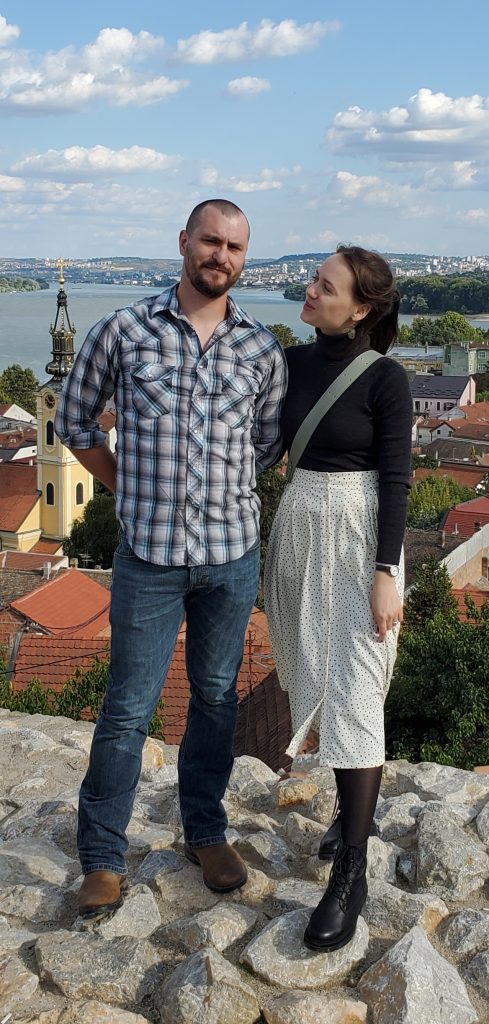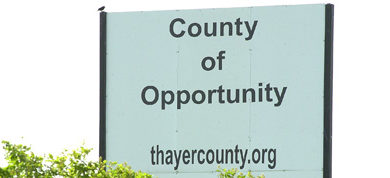Couple struggles through broken immigration system

Thayer County Commissioner David Bruning had a special request for Congressman Adrian Smith’s Office as Smith’s staff member, Jerad Reimers, gave the commissioners a recent update.
Reimers is out of the Grand Island office and has worked under Smith since 2015.
He said one of the advantages of working for him is when they are able to successfully help constituents.
Bruning’s request will give Smith’s office a chance to bring two people who have wanted to marry for quite some time, together for good.
Jerrod Sell met Yaroslava Gubareva in 2016 at Omsk University in Siberia.
Yaroslava lights up a room when she walks in, he said.
“She is kind of a dreamer. She believes in true love and can make anyone smile,” Jerrod said about his fiancee, who is a flight attendant, a career that is perfect for her and the travelers she meets.
Jerrod, educated in the Russian language and the country, left Omsk, but the two kept talking. They grew their friendship and in 2017, they rang in the New Year in Kazakhstan.
Jerrod returned to Russia for studies at the Moscow State Institute of International Relations. He and Yaroslava were dating by then. A year later, he was teaching English as a second language in Russia. In 2020, they started the process to bring Yaroslava to the United States.
And, every step in the immigration process since has been a struggle.
“We can’t seem to get along with Russia. When I’m in Russia, I spend a lot of time defending America and here, I’m defending Russia. It is not the evil we’re told,” Jerrod said.
Meanwhile, Yaroslava became a part of his family, and had long conversations with Jerrod’s late father, Pastor Stuart Sell, who passed because of pancreatic cancer in October. The pastor, originally from Chester, served in several church communities in Nebraska, including in Bruning at Trinity Lutheran Church.
His father, a huge Husker fan, set up a family game day group and eventually, Yaroslava was added to the group.
“She really liked him and he liked her. She brings life into people. She was devastated when he passed,” Jerrod said. “She never even met him in person, that’s the human side of it. Life doesn’t wait for visas and interviews.”
His “ray of sunshine” is half a world away.
“She could be here tomorrow, but she isn’t. We’ve done everything right and to no avail,” Jerrod, who also served his country as a U.S. Marine, said. “I went to Afghanistan for my country of my own free will and I ask one thing of my country, but it cannot deliver. I don’t ask much, I didn’t even want my GI bill because it wasn’t fair to use taxpayer money for school.”
There have been several barriers to Yaroslava’s immigration in addition to the tension between the U.S. and Russia — the U.S. closed consulates in Russia in December of 2020 and Covid-19.
Yaroslava has had the Russian vaccine, but must also have a vaccine approved by the Centers for Disease Control and Prevention.
Jerrod said it doesn’t matter who is leading the U.S., the immigration process is broken.
“I want to marry my fiancee. I keep calling her my wife because we should have been married two years ago,” he said.
She tried twice to get a tourist visa and was denied. The fees they pay to request visas are not returned.
The couple has a glimmer of hope — Yaroslava has been scheduled for an interview in Poland, but she still needs a visa to travel to Poland to apply for an American visa.
Sometimes, Jerrod can’t find the words to describe the woman he loves, the one he was going to marry from the day they met. He was shy in the beginning, but Jerrod knew.
If Poland allows it, Jerrod wants to be at the interview.
“I would tell the person at the interview we need to make this happen,” he said. The trip would also be a chance to visit his friends and hug Yaroslava’s grandfather, who calls Jerrod on his birthdays.
Both Jerrod and Yaroslava are determined.
“If we can get through this, we can get through anything,” he said. “That’s what gets me about her, she has never given up.”
Reimers said Smith’s office can’t discuss individual cases, but in general, the office will locate a caseworker, and make an official request on behalf of Smith and his constituents.
“We facilitate the conversation between the constituents and the agency until there is a resolution,” Reimers said.
He added Smith is extremely proud of the efficiency and success of the caseworkers.
Reimers said immigration requests are common.
“It is a confusing and complex process. Every country has a different immigration system and they all change depending on their governments,” Reimers said.
Federal bureaucracy is also a factor, and immigration can take an “incredible amount of time,” Reimers said.
“The whole process is slower than it needs to be,” Jerrod said. “Politics are not representative of the people.”



